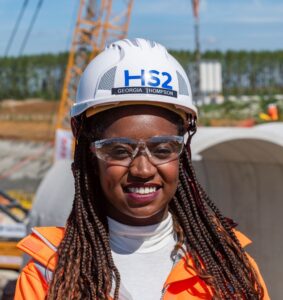Collaboration across and beyond all infrastructure sectors will be vital to the success in achieving net zero carbon.
This was the main conclusion following roundtable discussions and a panel debate that took place as part of ICE President, Rachel Skinner’s visit to the West Midlands.
The first roundtable took place on the first day of her visit, where a number of ICE Fellows working in the region from a range of sectors came together to discuss the carbon net zero challenge. The discussion centered around three questions: what the immediate steps that should be taken at a regional level are; how the civil engineering industry should widen collaboration with other stakeholders in carbon reduction activities; and how the UN Sustainable Development Goals (SDGs) support the aspirations of the West Midlands infrastructure outcomes.
What was clear was that collaboration across all sectors – including the different civil engineering sectors – is essential as the region strives to reach its ambitious net zero target. Real, rapid change will also rely on public understanding and a wider willingness to take the opportunity to change, permanently, how we work, travel, socialise and connect over the long-term, underpinned by support from consistent national and regional policy-setting.
Everyone agreed that providing more accessible sustainable public transport and reshaping cities will be fundamental to changing behaviour. However, a more holistic and inclusive approach was considered the correct approach, as every community has its own unique existing infrastructure and needs.
The second roundtable took place on day two, as Rachel was joined by infrastructure and senior leaders from key organisations including Network Rail, Transport for West Midlands, Aldersgate Group, Energy Capital West Midlands, Urban Splash and SWM (Sustainability West Midlands).Rachel acknowledged that the West Midlands already has a bold vision, since the West Midlands Combined Authority (WMCA) declared a climate emergency in 2019 and set an ambitious target for the West Midlands to be carbon neutral by 2041.
Everyone agreed that there is already much work being done in individual sectors at a local level, but that there is a serious opportunity to improve cross-sector discussions and best practice sharing to ensure that limited funding is utilised in the best possible way to tackle climate change.
A panel debate with experts from Transport for West Midlands, Network Rail, National Grid and Birmingham Council debated the challenges of delivering net zero, both nationally and in the West Midlands, and in particular, how digital tools will be increasingly influencing the design and construction decisions in strategic decarbonisation projects in the region.
Rachel Skinner, ICE President, said: “I have been really impressed with both the energy and appetite to tackle climate change in the region. I was delighted to see the clear commitment to – and understanding of – the regional aim to reach net zero carbon by 2041, ahead of the UK legally binding target of 2050. It is clear from the roundtable and panel discussions that collaboration – particularly between the private and public sector and with communities – is vital if we are all to start making a real difference. I do hope that by bringing key people together during my visit and encouraging fresh debate, we are helping to lay the foundations for continuing close working and partnership.”
Gbenga Oludotun, ICE West Midlands Regional Chair, said: “The need for various local and regional authorities to work together to achieve the West Midlands’ ambitious plan of reaching net zero carbon by 2041, has never been more important. I am thrilled that we were able to facilitate a meeting for Rachel with our regional infrastructure leaders. It is vital that we continue to engage with them to discuss what challenges and opportunities they see whilst working together to create a greener and more sustainable West Midlands.”
























